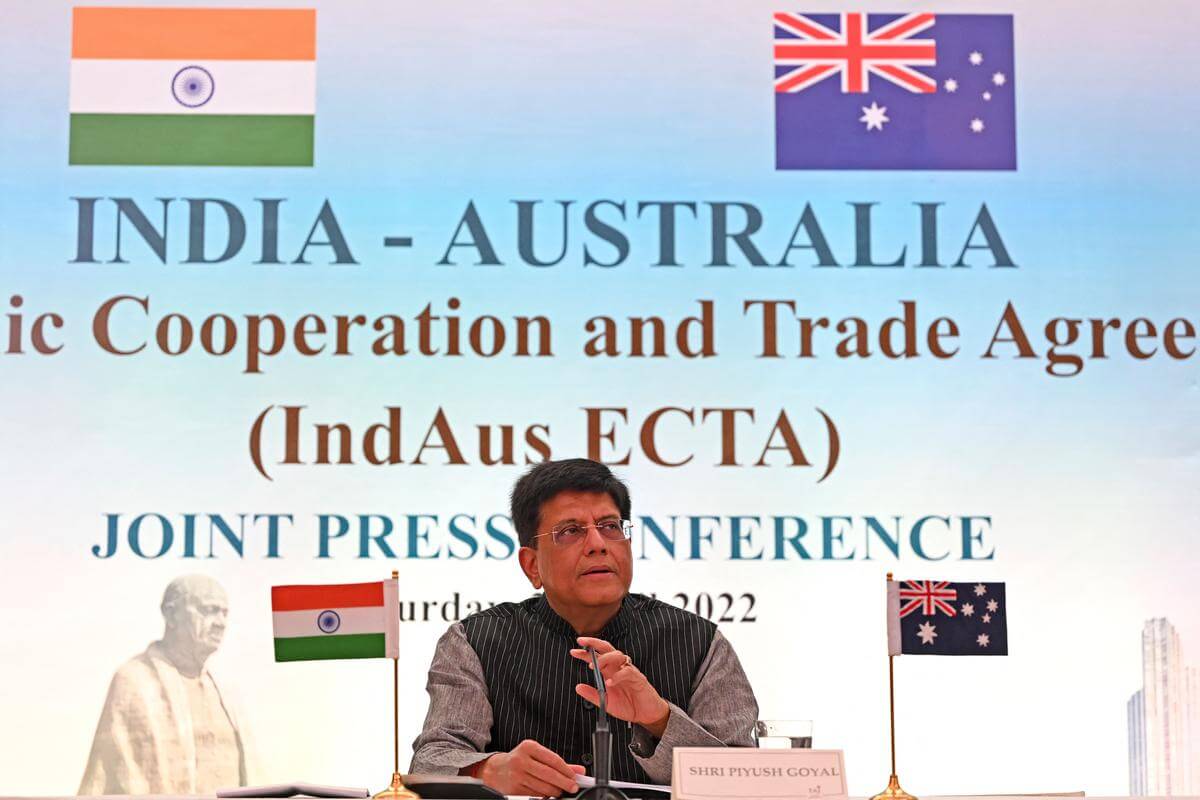The Australian Senate on Tuesday ratified a free trade agreement (FTA) with India that is expected to propel two-way trade from $31 billion to $45-50 billion in five years.
In a joint statement with Australian Prime Minister (PM) Anthony Albanese on Tuesday, Minister for Trade and Tourism Don Farell said that Australia-India Economic Cooperation and Trade Agreement (ECTA) presents “a great opportunity” for “Australian exporters, businesses, workers, and consumers,” as it will “open up new markets to reach around 1.4 billion consumers in the world’s fastest-growing major economy” and allow them to “reap the opportunities and benefits of more open trade with India.
Farrell noted that India offers the promise of “unparalleled growth opportunities for Australian business across a range of sectors, from food and agriculture, technology and green energy, to health and education services.”
🔗 to the Media Release by Australia's Minister for Trade and Tourism Senator the Hon Don Farrell: https://t.co/bp5lMvHpxE @PiyushGoyal @PiyushGoyalOffc @CimGOI @DoC_GoI (2/2)
— Barry O’Farrell AO (@AusHCIndia) November 22, 2022
He added that the deal “will enter into force 30 days (or another mutually agreed time) after the respective parties have confirmed in writing that they have completed their domestic requirements.”
PM Albanese said the new trade agreement “will strengthen [Australia’s] existing trade and economic relationships” and will help “create new opportunities for trade diversification and great outcomes for Australian business and Australian families.”
Meanwhile, Indian Commerce and Industry minister Piyush Goyal said in a tweet that he was “delighted” about the Australian side’s ratification.
He added that the outcome was “a result of [their] deep friendship” and “sets the stage for us to unleash the full potential of our trade ties & spur massive economic growth.”
“Australia will open 100% of their lines (products) with no restriction on even quota. This is the first time Australia has done for any country...We see job opportunities when Australian investment comes here,” Goyal told reporters.
Great insights from business leaders in Andaman & Nicobar Islands (ANI) on business environment & opportunities in ANI. #ECTA will present tremendous potential for new and exciting business collaborations between 🇦🇺 and 🇮🇳, including in ANI. @AusCGChennai pic.twitter.com/ykFEtOkzXJ
— Barry O’Farrell AO (@AusHCIndia) November 23, 2022
He said that the agreement, which was signed in April, was “fair and good for India.”
The Indian Union Cabinet will now approve the deal, while the Australian parliament will forward it to its executive council. Following complete ratification from both ends, the countries will then decide on a mutually agreeable date for its implementation.
Goyal assured that these approvals are “very much doable.”
The bill was first easily passed by Australia’s House of Representatives on Monday and the Senate’s approval made them law on Tuesday.
Once enacted, the FTA will give more than 6,000 sectors in India duty-free access to the Australian market. Notable beneficiaries include labour-intensive sectors such as textiles, leather, furniture, jewellery, sports, electrical goods, railway wagons, and machinery.
India will remove taxes on 90% of Australian exports, including meat, wool, cotton, seafood, nuts, and avocados. Meanwhile, 96.4% (by value) of Indian exports will be granted zero-duty access to Australia. Some of the included products currently have a 4-5% customs duty in Australia.
In 2021-22, Indian exports to Australia were valued at $8.3 billion, while it imported goods worth $16.75 billion from the country.
Thank you PM @AlboMP! The entry into force of IndAus ECTA will be greatly welcomed by our business communities, and will further strengthen the India-Australia Comprehensive Strategic Partnership. https://t.co/7gdaFNKTOw
— Narendra Modi (@narendramodi) November 22, 2022
The FTA’s finalisation comes a few days after the PMs of both countries met on the sidelines of the 17th edition of the G20 summit. Following the meeting, Albanese announced his trip to India next March and said that his government regards the ECTA as being “very important for expanding the economic relationship” between the two sides.
He added that a business delegation would accompany him on the visit, which will “be an important visit and an upgrade in the relationship that we have between our two nations.”
The deal with Australia could also be another step towards India’s integration with the trading network of the Regional Comprehensive Economic Partnership (RCEP). India walked out of the pact in November 2019 due to Chinese trading practices, but now has FTAs with almost all its members, except China and New Zealand.
The ECTA is expected to come into force by January 2023.

